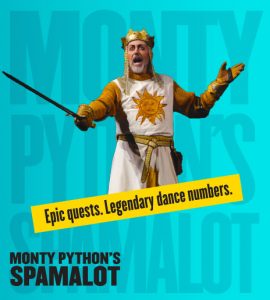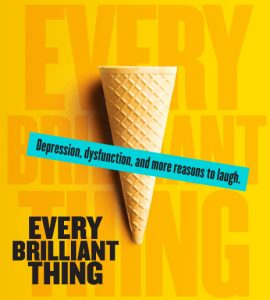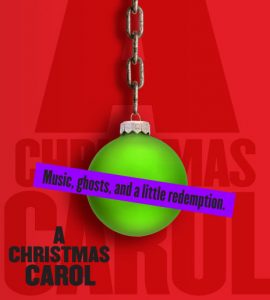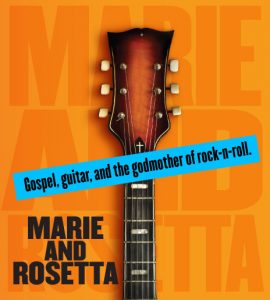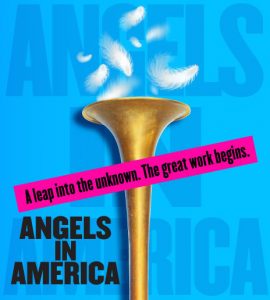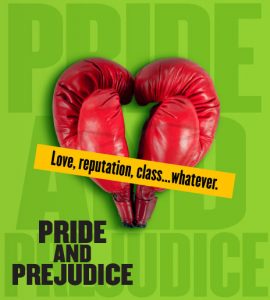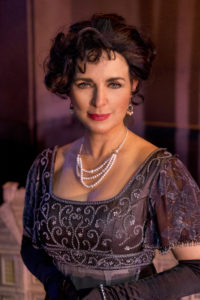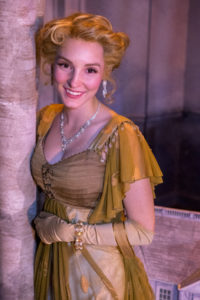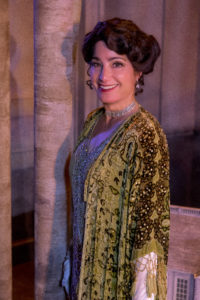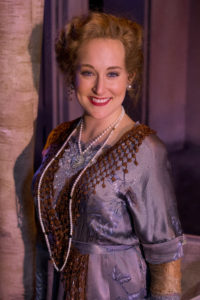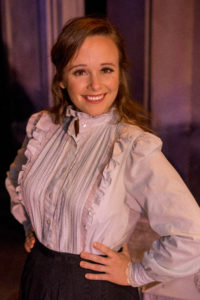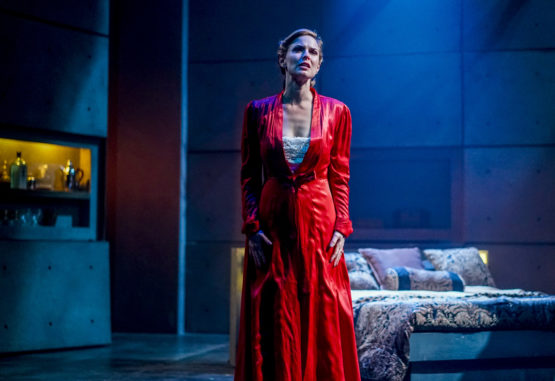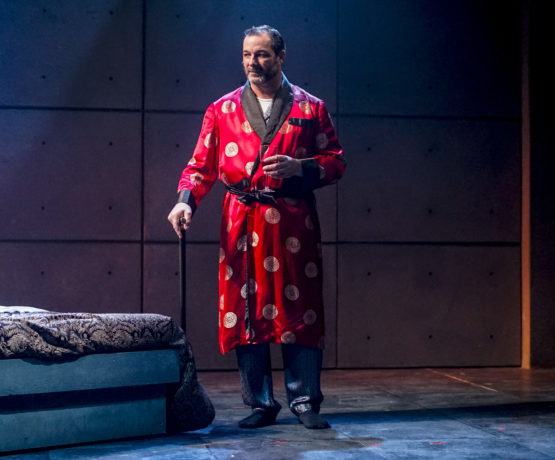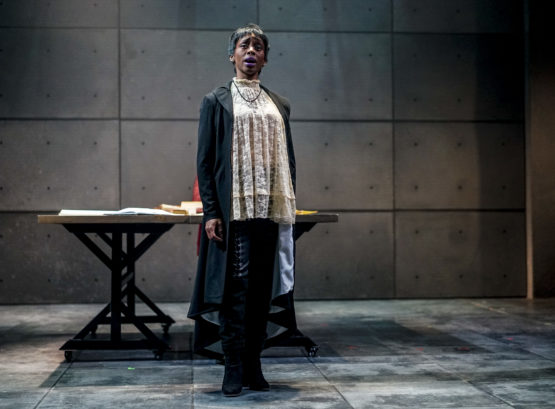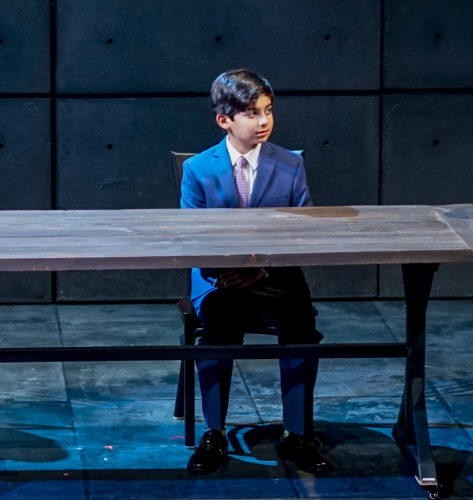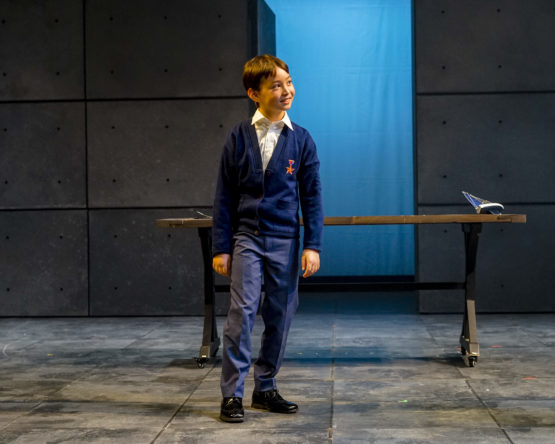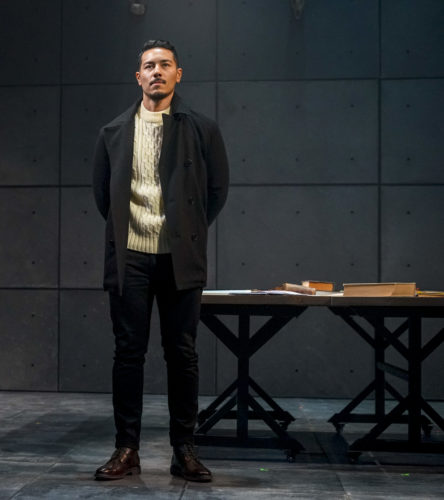Director’s Notes: HIR

Taylor Mac is an artist who has forever changed the way I view the world. Much like other plays in the genre of absurd realism have—Albee’s The Goat and Shepard’s Buried Child, to name a couple. “Hir” is a seldom used third gender pronoun pronounced “here,” for the double meaning of what’s happening here, in homes across the country. Mac looks at the American family and the traditional roles we are asked to play in a world whose rules keep changing. So many things we once took for facts have turned out to be nothing more than ideological rules that helped perpetuate the patriarchy. So what happens when our ideals are rendered impotent?

Taylor Mac, whose gender pronoun is “judy” (yes it is hard, and thats the point) asks us to take a look at what’s happening around us and decide whether we will be part of this new world in transition. Perhaps you can’t build a clearer future without making a mess of the past. Mac knows full well judy’s audience, the white cisgendered majority. Mac also knows what a regional theatre audience loves to watch—old forms; the family kitchen sink narrative.

This is a play about a revolution and how we deal with the repercussions. If we explode the patriarchy, how do we care for the pieces left behind? Where do the straight white men go? It’s clear that the world needs more estrogen in leadership, but perhaps that’s not enough— perhaps queering the world up will save us.
HIR runs though Oct. 28 at Cygnet Theatre. Buy tickets here.
Director’s Notes: Every Brilliant Thing
If we do our job, you will leave the theatre with a better sense of community and a new perspective on mental illness. I hope you will start conversations about these subjects, as they are still very taboo.
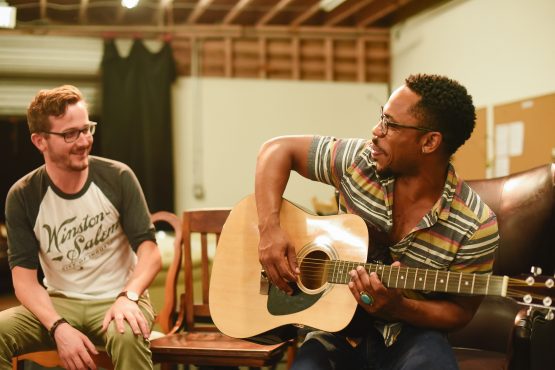
The variable hard wired into the show is you. You entered the theatre as an individual and leave as a member of a community. Some of you will act, some of you added to the list. It is our intention to have a conversation with the lights on, to meet the audience with a hug and hold their hand along the way.
The playwright allowed us to stretch the fabric of this play around the performer and his life. In the improvisations with audiences early on we found that we had to practice, “radical inclusion.” How do we always make a positive choice in our interactions? How do we always make the audience feel loved and safe and heard? For example: If Ro wants an audience member to be louder in his interactions, he needs to set the example with his own voice. In the process of answering these questions I realized just how much this play marries form and content. The message that we learned as a rehearsal technique is also the core message of the play.
How do we make others feel? Set the example. Call that person you fear suffering from depression. Be kind and gentle one another. Stop and listen. As our playwright writes, “We’re all subconsciously affected by the behavior of our peers.”
There is brilliance all around us. We are in this together.
For my Uncle Bobby.
Every Brilliant Thing runs through Sept. 16 at Cygnet Theatre.
Director’s Notes: Monty Python’s Spamalot
Sean Murray directs and stars in Monty Python’s Spamalot this summer at Cygnet.
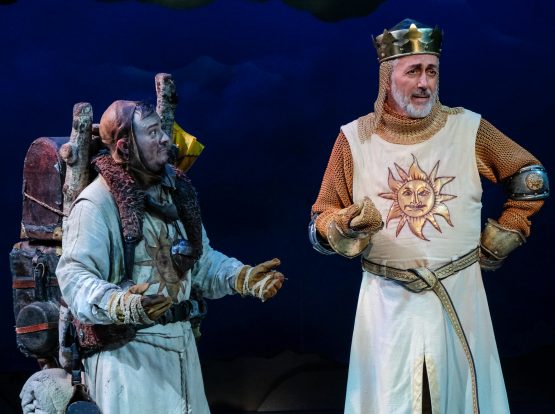
Spam. Killer rabbits. Penguins on tellies. The Minister of Silly Walks. The Spanish Inquisition. Lumberjacks in suspenders and a bra.
Like many teenagers in the 70s, me and my friends were obsessed with Monty Python. We knew all the lines from their inspired and loony sketches on their BBC show, The Flying Circus. Then in 1975 their first film came out: Monty Python and the Holy Grail. Stop. Just stop. We couldn’t breathe! King Arthur and his Knights clomping around Britain accompanied by clacking coconuts! They encountered mud flats, the plague, surly French taunters, Knights of Ni in scene after scene of hiliarious insanity.
Then in 2005 Pythoner Eric Idle had the even more lunatic idea of adapting this comic classic film into a Broadway musical. Reshaping it and molding it into an entirely new thing, he brought on Broadway heavy-weights to bring it in a smash. Mike Nichols to direct. San Diego local-done-well Cacey Nicholaw to choreograph. Comedians Tim Curry, Hank Azzaria, David Hyde-Pierce, Chris Sieber and Christian Borle took the famous roles.
The show received 14 Tony nominations and won Best Musical. I think they did okay.
So enjoy. If you don’t I will say “Ni” again to you.
Monty Python’s Spamalot runs through August 12. Buy your tickets now!
Cygnet Theatre Announces a New Look!

If the old adage “what you see is what you get” really is true, we want to make sure you, as an audience member, know exactly what you can expect from Cygnet. We worked with brand design agency MiresBall to create a fresh new look and feel for the next phase in our company’s growth. After revisiting our organization’s mission and values, gathering feedback from key stakeholders, and a series of brainstorming meetings, our new brand identity emerged. We are very excited about the new direction and hope you are too!
Our graphics: Over the past 15 seasons big things have happened on the Cygnet stage. As we begin the next phase of our company, kicking off our sixteenth season, we have updated our branding and graphics to be more in line with the artistic choices we make on that stage. Bold, sophisticated, curious.
Our logo: The swan has been part of our DNA since we took flight. It’s in our name. It’s got momentum, personality, and strength…Just like Cygnet Theatre. Learn more about our history and name.
Our tagline: Up close. Far reaching. It’s what we do in four words. Up close is what patrons love about coming to a Cygnet show. With 246 seats, there isn’t a bad seat in the house and each performance is an intimate experience. But the work we do here covers ground. Emotionally, artistically, and in the community. It’s Far Reaching.
About MiresBall
For category leaders—and those who aspire to lead—MiresBall provides trusted creative expertise drawn from 30+ years of work with global brands. With a balance of passion and pragmatism, we give organizations the confidence to aim higher and achieve more.
Open Your Hearts to the Characters of The Wind and the Breeze
Meet the strong characters of The Wind and the Breeze; Sam, Tea, Ronda, Nia, Ana and Shantell.
Moving the crowd as legendary emcee Sam is Terrell Donnell Sledge. His faithful group of protégées include Cortez L. Johnson as Tea, Chaz Shermil as Nia, Nadia Guevara as Ana, and Demetrius Clayton as Shantell. Rounding out the cast is Monique Gaffney as the no-nonsense police officer, Ronda.
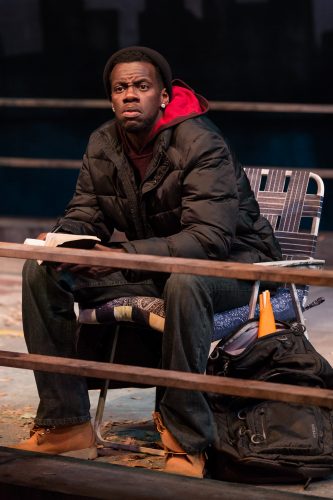
SAM: An old soul. A stubborn root. The best emcee around and it isn’t close.
“Failure is a beautiful, beautiful sword. Separates hearts from heads.
So you can think.
So you can strategize.
So you can put yourself back together the way you want to.”
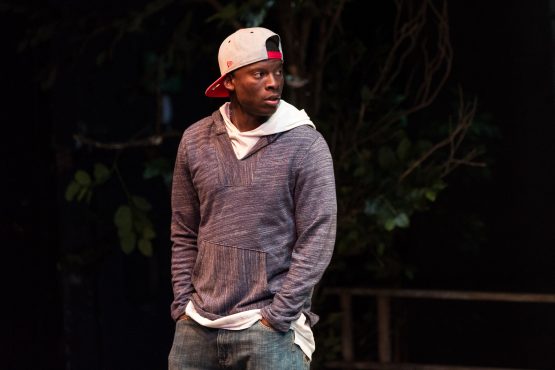
TEA: A class clown without trying to be. Too lovable for his own good. What he lacks in talent, he makes up for in optimism.
“Damn.
Atlanta ain’t got no Beef-a-Roos?
…
Shit.”
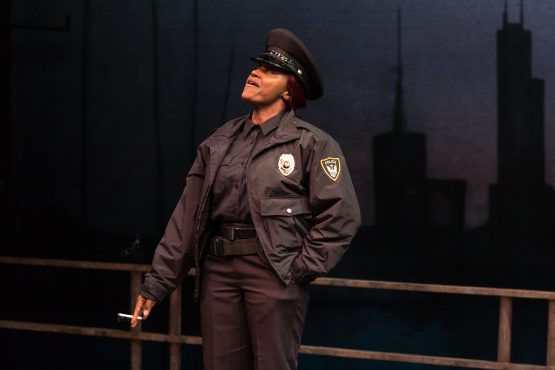
RONDA: A no-nonsense police officer A knower of things unseen.
“We ain’t from here.
We from God.”
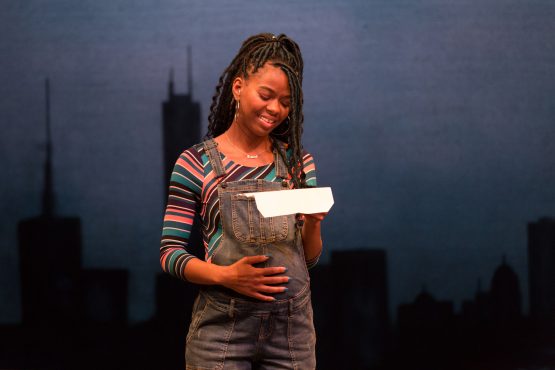
NIA: “Nia” means purpose. Self-aware without being self-absorbed.
“Heroes is heroes. They will always wanna be like you”
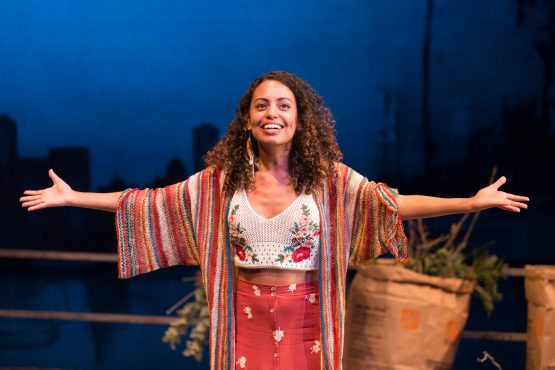
ANA: A beautiful, talented singer. A generous heart. Ready for a new beginning.
“…every place is the same…
I mean like in terms of things that actually matter”
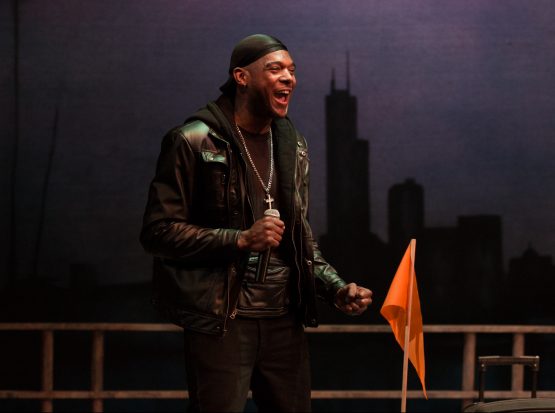
SHANTELL: Acerbic. Driven. Talented emcee.
“But see I don’t get hustled, cause I got game.
Please try to play me, cause I’ma flip that real estate”
The Wind and the Breeze closes June 10th. Don’t miss it!
Playwright & Director Notes: The Wind and the Breeze
The director and playwright of The Wind and the Breeze talk about this lyrical drama. Catch it May 16 – June 10 during its world premiere at Cygnet Theatre!
Rob Lutfy: Director
From the Selection Committee of the Whiting Award:

“Nathan Alan Davis is a genuine poet of the theatre, charting new territory for lyrical drama. Play after play showcases his uncanny gift for allegory and language, boiling down the large narratives of the African-American past to the scale of individuals wrestling to express themselves. He exhibits unwavering command of styles and textures, from vaulted diction to teen slang. His verve, emotional intelligence, and ambition are outstanding.”
I love this play for its people; they are family to me. I have lived with and fought for this play for six years now. Nathan Alan Davis has become one of my dear friends and his plays continue to captivate me. The things I have grown to love about Nathan’s writing are all here even if this is perhaps his most realistic and subtle play. Anyone close to Nathan knows that he sees signs in life due to his deep awareness of God in all things– even in how his children were born. I love that about Nathan and I love that about the people that inhabit his plays. Nathan has written a meditation on change, acceptance and dreams. Every word matters in Nathan’s plays, just as every word left unspoken.
What really matters in life are the people around us. So often we put all our energy and focus into chasing our dreams that we lose ourselves in the process. We place expectations on ourselves and others and at times sacrifice too much to get ahead. Sam is learning the patience it takes to let go and accept his station in life. And this lesson isn’t one you can work at. It comes when you least expect it and most of the time it’s been under your nose all along.
This is also what Nathan is asking of his audience: patience.
Patience to see the metaphors in the play
Patience to know that Nathan has given you just enough to connect the dots
Patience to see something as simple as saying I love you by offering an ice cream sandwich.
Nathan makes the seemingly mundane magical and poetic. Open your hearts to Sam the Bermuda triangle, Sam the State Street bridge troll, Sam the Living Rock City Legend, Sam the Prophet, Sam the hero, Sam the enigma.
For Owiso Odera, who loved this play with all his heart. And for every director, literary manger, actor, stage manager, dramaturg, designer, and audience this play has seen in its journey to this world premier.
 Nathan Alan Davis: Playwright
Nathan Alan Davis: Playwright
This is the second play I ever wrote. The first draft, which I wrote somewhere around 2010, only had four of the characters (SAM, TEA, NIA and ANA). In 2012 I did a workshop at the Kennedy Center, which was the impetus for fleshing out the play more and adding the additional characters (RONDA and SHANTELL). That’s also where Rob Lutfy first saw the play and he and I connected shortly after. In 2013 this play won the Lorraine Hansberry Award. Then in 2015 I did a workshop at the New Harmony Project, which is where I think the play fully found itself. The initial impulse was to write a very conversational, slice of life play and thankfully I’ve been able to maintain a connection to that. The play is set in my hometown (Rockford, IL) and it is in many ways about the conflicted feelings we have about where we came from. What it means to leave. What it means to stay. Who you leave behind. How you change and whether or not the people you love most change along with you.
In 2016 this play won the Blue Ink Playwriting Award and received a staged reading at American Blues Theatre, Rob Lutfy became attached to the play during the workshops in LA at The Theatre @ Boston Court, at Cygnet, and for our final workshop with the world premier cast you see here at The Milwaukee Repertory Theater.
The reading we did as part of the Bill and Judy Garrett Finish Line Commission in 2016 went very well and the audience was very connected and very engaged. So that was encouraging. A lot of times with plays that come from Black writers and feature Black characters – or characters from other marginalized groups – there is an expectation (sometimes spoken, sometimes unspoken) that there will be a social issue or historical trauma at the center of the story. I’ve written those plays before and I will again – but this is not that play. To find a professional theatre that is willing and excited to embrace The Wind and the Breeze on its own terms was not at all a sure thing. Cygnet stepped up to the plate and I’m thrilled to bring it to life here.
I hope that people see themselves, their families and their friends in the play. In fact, I’m pretty confident they will. But if the play works as it’s intended to there won’t be one single takeaway or one simple meaning. If anything, I hope that people will emerge feeling more whole. More connected to their past and to their present.
A Little Night Music: Q&A with the Actors
Remember, darling? A Little Night Music was staged exactly 10 years ago as our first production in our Old Town home. It is so great to have this delightful musical on our stage again.
We asked some of the very talented cast about their favorite Sondheim productions, the songs that have an affect on them, and their favorite “Night-Music-Moment”.
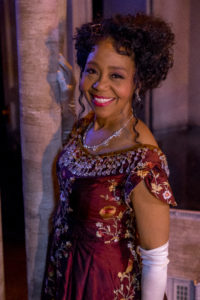 KAROLE FOREMAN (Desirée Armfeldt)
KAROLE FOREMAN (Desirée Armfeldt)
What is your favorite Sondheim production?
Sweeney Todd!
Send in the Clowns gets people emotional. What other song affects you like that (musical theatre or other)?
One Song Glory from RENT. I lost a lot of friends during the AIDS epidemic in the 80’s and 90’s.
What is your favorite Night-Music-Moment?
A Weekend in the Country.
What is your favorite Sondheim production?
I saw the original first national tour of Sweeney Todd with Angela Landsbury & George Hearn. I was just a little kid (probably too young to see it at that age.) It scared the crap out of me but I remember the whistle going through my bones. Amazing.
Send in the Clowns gets people emotional. What other song affects you like that (musical theatre or other)?
Mama, A Rainbow from Minnie’s boys and You are Your Daddy’s Son from Ragtime.
What is your favorite Sondheim production?
I love this one – A Little Night Music! The story is so rich and the music is full of hidden gems that reveal character motives and feelings. Sondheim leaves so many Easter eggs that are so exciting to find! I also love the review Sondheim on Sondheim as well because I love the witty footage.
Send in the Clowns gets people emotional. What other song affects you like that (musical theatre or other)?
I always cry when I listen to the musical Come From Away in its entirety. I also get teary listening to Mother Nature’s Son by The Beatles.
What is your favorite Night-Music-Moment?
Too many to count!! I dig the opening sequence we do. I loved the rehearsal process, making discoveries and watching the entire company make brilliant choices.
What is your favorite Sondheim production?
So many. Top five would be: A Little Night Music (of course), Follies, Merrily We Roll Along, Passion, Sweeney Todd.
Send in the Clowns gets people emotional. What other song affects you like that (musical theatre or other)?
I have a lot of these too, in several genres. Musical theatre: Not A Day Goes By, Let Them Hear You and ‘Til We Reach That Day from Ragtime. Pop: The Promise by Tracy Chapman. Movie: Gabriel’s Oboe from The Mission and Love Theme from Sophie’s Choice.
What is your favorite Night-Music-Moment?
I have several of these too! I love the end of Act One – A Weekend in the Country; brilliance in storytelling and musicality. Every Day A Little Death; hauntingly beautiful song. I also love the “wooden ring” monologue that Madame Armfeldt has in the Second Act.
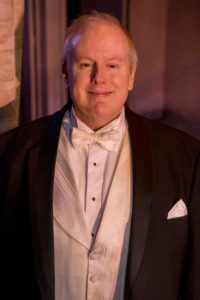 JOSEPH GRIENENBERGER (Mr. Lindquist)
JOSEPH GRIENENBERGER (Mr. Lindquist)
What is your favorite Sondheim production?
My favorite work overall is probably “Sweeney Todd,” but “A Little Night Music” is the most delightful and refined work.
Send in the Clowns gets people emotional. What other song affects you like that (musical theatre or other)?
A Simple Song by Leonard Bernstein, Children and Art by Stephen Sondheim, and If I Ever Say I’m Over You by John Bucchino.
What is your favorite Night-Music-Moment?
So many to choose from, but I think the dining room scene is outstanding writing.
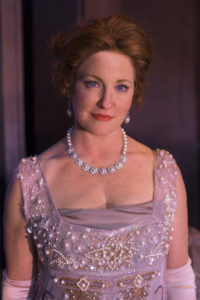 CHRISTINE HEWITT (Mrs. Anderson)
CHRISTINE HEWITT (Mrs. Anderson)
What is your favorite Sondheim production?
Into The Woods and Company.
Send in the Clowns gets people emotional. What other song affects you like that (musical theatre or other)?
Losing My Mind (Follies – Sondheim), Not A Day Goes By (Merrily We Roll Along – Sondheim), No One is Alone (Into The Woods – Sondheim). Can you tell I’m a fan?
What is your favorite Night-Music-Moment?
Soon.Now.Later – song trio and the dinner scene.
What is your favorite Sondheim production?
Into the Woods – The storytelling is seamless and the music is gorgeous.
Send in the Clowns gets people emotional. What other song affects you like that (musical theatre or other)?
Being Alive (Company), You’re My Home (Billy Joel), Rhiannon (Fleetwood Mac), and You’ll Never Walk Alone (Carousel).
What is your favorite Night-Music-Moment?
I am not sure it has happened yet. There are so many wonderful moments throughout the show, but many of the most fun moments happen offstage!
What is your favorite Sondheim production?
Into the Woods has always been my favorite. It is remarkable because as I have gone through life my perspective has changed and I am still able to identify with a different theme or character.
Send in the Clowns gets people emotional. What other song affects you like that (musical theatre or other)?
Everything Changes from Waitress. The first time I heard it I was pregnant with my daughter and had just lost my mom. I felt like it was speaking directly to what I was feeling- immense grief but so much new hope. I still feel that every time I listen to it.
What is your favorite Night-Music-Moment?
I love Weekend in the County when everyone is singing their respective lines, overlapping each other. I also love Soon.Now.Later! And it has been amazing getting to know everyone during the rehearsal process.
Catch A Little Night Music through April 22nd!
Director’s Notes: A Little Night Music
Cygnet Theatre is excited to revisit A Little Night Music. Director Sean Murray shares his thoughts on this popular musical.
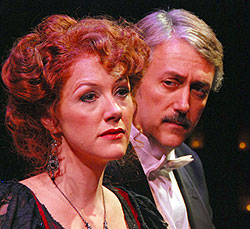
When Stephen Sondheim and Hal Prince began to work on their next collaboration following Company and Follies, they were responding to criticisms that these works, both explorations of the difficulties and anxieties of marriage, were cold and overly intellectual. They set out to prove in their third effort that they could also create something both commercial and adult.
After a search, Sondheim/Prince found in an Ingmar Bergman film, Smiles of a Summer Night, the perfect material for their sophisticated sex comedy: mismatched couples, longing, regret, reconciliation, all under the magical dusk of the Summer Solstice. Literature is filled with such stories as mismatched lovers leave their world of society, etiquette and rules and find themselves in a forest or garden and return to society transformed. Think A Midsummer’s Night Dream, As You Like It, Into the Woods or any of the fairy tales of the Brothers Grimm.
Sondheim is famously obsessed with games and crossword puzzles and often thrives when creating musical and linguistic challenges for himself. In adapting Smiles of a Summer Night into a musical format, he came upon the realization that the film is filled with the number three: three smiles of the summer night, the three generations of the Armfeldt women, the three misaligned couples. The essential energy of the number three is unstable. Three wants to pull towards the more solid number two. A love triangle needs to resolve itself into a single couple. Each character finds themselves locked into an unsatisfactory triad: Fredrik-Anne-Desiree, Fredrik-Desiree-Carl Magnus, Desiree-Carl Magnus-Charlotte, Charlotte-Desiree-Carl Magnus, Anne-Charlotte-Fredrik, Petra-Henrik-Anne, etc. In Night Music, even the songs that are sung by two characters together are almost always about a missing third person! It takes the smiles of that summer night to transform these triangles into couples and reconcile them to get to our story’s resolution.
Inspired by the number three, Sondhiem set for himself the challenge of writing the entire score based upon variations of the waltz. (Alright, there is one very short segment of underscore that is not in waltz time!) But the lilting waltz time in the score definitely lends the story the air of elegance and magic. Sondheim’s score is firmly rooted in the Viennese operetta. The show-opening “Night Waltz” provides the perfect theme for these variations of three—both musically and dramatically. Sondheim uses this as his framing device, saying that “the whole score would feel vaguely like a long waltz with scherzi in between so that no song would seem to have come from another texture.” Sondheim puts the triple meter through hoops as he uses different dance forms as the basis for various songs: the mazurka in “The Glamorous Life,” the martial polonaise for “In Praise of Women,” and a sarabande to accompany Madame Armfeldt’s reminiscing “Liaisons.”
The result is that this gorgeous piece finds itself a classic of musical theatre. As the character’s stories span several generations, from the young, to the fools and to “those who remember,” there is a way into this story for everyone. I have certainly found more in the text and score every time I’ve worked on it. It’s a rich and delightful piece and I hope you enjoy it.
A Little Night Music runs March 7 – April 22, 2018. Click HERE for tickets.
Cygnet Theatre Announces New Pricing Structure
Here at Cygnet we feel theatre should be accessible to everyone. That’s why we’re shaking things up. We want you to see our plays for $25!
How can you get a $25 ticket?
- You can Subscribe.
- You can purchase a Member Card.
- You can buy your tickets early.
Subscribing is the best deal with the most perks! Subscribers are guaranteed their favorite seats PLUS the lowest price for each show. Click here to subscribe.
You also can get best prices year-round with a Cygnet Member Card. A member card allows you to purchase $25 tickets for any show we offer, any time you decide to buy. Contact the box office at 619-337-1525 to purchase a member card.
Not a member? You can also get your $25 tickets by purchasing them early. Ticket prices will go up as the show date approaches. Click here for ticket info.
TIER1 – $25 for a play and $35 for a musical
TIER2 – $35 for a play and $45 for a musical
TIER3 – $45 for a play and $55 for a musical
For more on the new structure and how the tiered pricing works, please contact the box office at 619-337-1525.
Q&A with The Cast of The Last Wife
This contemporary re-imagining of the compelling relationship between Henry VIII and his last wife, Katherine Parr, is a witty and powerful examination of sexual politics and women’s rights.
We asked The Last Wife cast about this wonderful play. Here is what they said:
Why do you feel this play is relevant today?
It’s a play that has many layers. Not just about the struggles that women have dealt with for centuries, but how people use power to control and manipulate.
What drew you to this script?
Katherine Parr was an unknown hero. She changed the course of history for all women. I wanted to play that woman. I wanted to live in her daily life filled with danger, struggles, and successes. What better way to do that, than peel Parr open with The Last Wife!
Why do you feel this play is relevant today?
In today’s sexual/political climate it is extremely relevant, maybe more so than it was just a couple of years ago when it was written. It’s an example of the seemingly endless struggle women have had in gaining what should be their natural rights of equality and respect.
What drew you to this script?
I was drawn by the strong writing and the chance to dive into this complex character. During his reign, Henry seemed to be both feared and beloved. A man who was a reluctant King and yet not afraid to exercise his authority.
Why do you feel this play is relevant today?
This play is relevant because there is a dire need for discussion about gender equality and patriarchal privilege.
What drew you to this script?
I was drawn to the script because I love exploring history in an accessible, contemporary, and dramatic manner. History usually never interests me unless it is told in a way that doesn’t feel static or irrelevant. This play is not only relevant but deeply necessary in this current political climate.
Why do you feel this play is relevant today?
I like this show because it is about strong women. I think men try to control what place women have where they work and in politics and pretty much everywhere and it has happened throughout history. I also think this play shows how families can change and look different. It is not about just a mom and dad and their kids, there are other people who come into their lives and change how the family works.
What drew you to this script?
I didn’t read the script before I auditioned. The part of Eddie is a bit sad because his mom died and he now has a new mom, a dad who doesn’t spend a lot of time with him, and he is just a kid who doesn’t have any control of the things that are happening in his life even though he is stuck in the middle.
Why do you feel this play is relevant today?
The personal and social issues still resonate, and the danger and intrigue is exciting.
What drew you to this script?
Who wouldn’t want to be a prince?!
Why do you feel this play is relevant today?
It seems as though every day we learn of a new person-in-power stepping down from allegations of sexual misconduct, misogyny, inappropriate behavior, to name a few. With the head of our country also steeped in such charges, now more than ever, a story about women living surrounded by such men is more poignant than ever. But even more important, a story about strong women who fought through the noise and risked death for what they believed in, in order to advance women even if it wasn’t in their lifetime, is such an important part of history to know and hopefully inspire all people in our current climate to fight for what they believe is right.
What drew you to this script?
The point of view of the story. I’ve known the story of Henry VIII through various studies of the classics and history, but never have I learned much about the women who endured him. Especially never about his last wife and all the incredible things she accomplished as a woman in those times, not just as the kings wife, but as a person in general. Plus, it’s expressed beautifully with great dialogue and complex characters. Really humanized these people, which is attractive to an artist like me when considering a project.
Get your tickets today! The Last Wife closes on February 11th.
